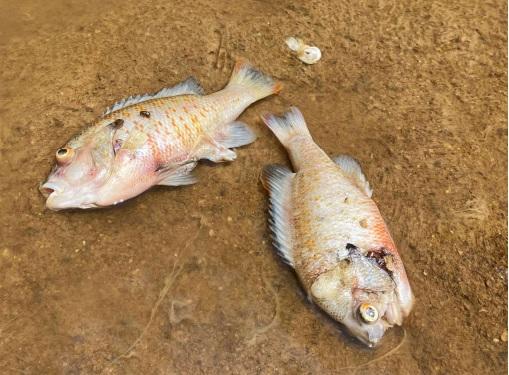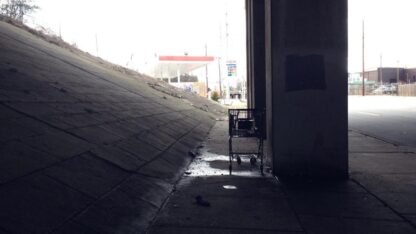Tankers hauling mystery sludge have been a common – and unwelcome – sight in rural Wilkes County for more than a decade, regularly filling the country air with a putrid aroma.
But those haulers have been skipping past Wilkes County lately.
That probably has something to do with a fish kill last summer that attracted a glaring media spotlight and brought public scrutiny to a waste disposal practice that wiped out more than 1,600 fish in the Little River, which is part of the prized Savannah River Basin.
The gruesome incident was traced back to wastewater from industrial sources – in this case, a pet food plant in Hart County and a milk facility in Gwinnett County – that was deposited in a farm pond under the state’s soil amendment program and applied to a hay field.
That pond’s berm failed, leading state regulators to fine the farm $85,000 and bar it from accepting more soil amendments, according to a state Environmental Protection Division consent order.
More than 200 loads were delivered to the farm over the course of a month and a half leading up to the pond’s collapse, according to the EPD document.
But the tankers haven’t stopped coming to rural northeast Georgia, says Wilkes County Commission Chairman Sam Moore.
When they come back to Wilkes County, which is home to about 10,000 people, Moore says he’ll know. His phone will likely light up with complaints from residents about the smell, flies and buzzards.
There have been times when the stench was so bad that residents called him convinced there had been a breach at the wastewater treatment plant.
“We’re a farming community. We have poultry houses. We deal with poultry litter, and people understand that. They know that. But this is something that’s totally different,” Moore said. “And it just keeps lingering because they continue to put it out. When they start at a place, they’ll just saturate the place.”
Moore said these communities feel like they are “being used as a dump site.”
“If it was such a good product, people would be fighting to get it, but no, they have to pay somebody a hundred miles from where it was sourced at to take it. How does that make any sense?” Moore said.
Instead, the haulers are making a stink in other counties for now. John Graham, chairman of the Warren County Commission, says the stench and flies continues to soil the country living that attracts people to communities like his.
“Most people come to our small rural county for the nice, quiet nature of it. You can have a little bit of property where you’re not on top of everybody and enjoy the outdoors. But you can’t even go outside when you got this floating around,” he said.
‘That’s not soil amending. That’s dumping.’
Concerns about sludge being passed off as a soil amendment has landed in front of lawmakers twice in the last three years – and it may be heading their way again this session.
It’s an issue that has brought together north Georgia county officials and environmentalists who argue the program is being abused by bad actors, which is making life unbearable for neighbors and putting the state’s waterways at risk.
Soil amendments are commonly used on farms to improve certain physical characteristics, such as water retention or reducing compactness. They include a range of products, including byproducts from poultry processing plants.
“A soil amendment would be a one-time application to get the soil correct, not a continual application. That’s not soil amending. That’s dumping,” said Tonya Bonitatibus, executive director of the Savannah Riverkeeper. “And the laws are still written in a way that allows the definition of dumping to qualify as soil amending.”
Bonitatibus, who has been tracking the issue for 16 years, argues that what may seem like an agriculture-friendly practice on the surface is hurting farmers and landowners.
“We are a state that on its face is very ag friendly, and this seems like a really good thing for ag, and unfortunately, it’s been hiding under that veil for a really long time,” she said.
Riverkeeper groups, county officials and the state’s county association are pushing lawmakers to let local governments help enforce state rules and require more transparency about what is being applied and where.
Bonitatibus argues recipients of soil amendments should also have to prove they produce an agricultural product and then show that the product is safe through regular sampling.
“It’s a program with really good intentions and really good possibilities that is being horribly run,” she said.
As it is, all county officials can really do is call the state Department of Agriculture or EPD when someone runs afoul of the rules.
“They’re saying you’re against the chicken industry, you’re against agriculture. But they have a waste and why are they not made to do something with their waste like every other industry?” said Graham, the Warren County chairman.
In Warren County, officials are experimenting with a permitting system that limits the activity to certain areas and imposes limits on how long the product can be stored on site.
“If it killed fish, then what is it doing to the ground?” Graham said. “And as it’s getting put down and it’s running into streams, what is it doing downstream? What is the effect three years from now? We don’t know.”
‘It’s not enough just to drive it out of district.’
A northeast Georgia lawmaker, Rep. Rob Leverett, is readying a measure for this legislative session.
“It’s my No. 1 issue,” said the Elberton Republican who represents Wilkes, Elbert, Lincoln and portions of Madison and Columbia counties along the South Carolina border.
Leverett said he is working on a bill that would let Agriculture Commissioner Tyler Harper delegate limited enforcement authority to counties. His proposal also calls for the creation of an information portal that would give county officials access to basic information like the source of the soil amendment and what the product is.
He argues that changes are needed to protect a program that he sees as an essential tool for agriculture.
“It’s an important program,” said Leverett, who is an attorney by trade. “And I just don’t want these abuses to begin overtaking the system so that you start having public calls to abolish it altogether.”
More recently, the haulers have caused a stink in Jefferson County, just southwest of Augusta. Last fall, a crowd of frustrated residents pressed the county commission to crack down on the practice.
“It’s not enough just to drive it out of district. We need to come up with some solutions that work for everybody,” Leverett said.
The state Department of Agriculture was empowered in 2020 to regulate the mostly liquid products while targeting bad actors. And then in 2021, a measure sponsored by then-state Sen. Harper narrowly passed that curbed the power of local officials to use zoning to require buffers between residents and sites where the smelly sludge is sprayed.
Last year, lawmakers passed the so-called “freedom to farm” act, which made it harder for neighbors to file nuisance claims against agricultural producers.
The agency’s new rules and regulations took effect in December. There are two compliance specialists on staff to enforce the soil amendment rules and regulations statewide, but a spokeswoman said the agency is evaluating the need. Two complaints were received last month, she said.
Harper, who was sworn in as agriculture commissioner last month, said in a statement Thursday that his administration is “going to be proactive and vigilant about enforcing the rules and regulations regarding soil amendments to ensure we are both promoting our agriculture industry while also protecting Georgia consumers.”
Harper also said he was reviewing current rules and regulations and “developing our own plans to address this sensitive topic.” He did not comment specifically on Leverett’s proposal.
But Leverett’s plans will likely ruffle feathers in a state where chicken broilers are big business.
Mike Giles, president of the Georgia Poultry Federation, defended the industry byproducts that are applied to Georgia farmland as soil amendments Thursday.
“Soil amendments have a long history of use in Georgia’s agricultural fields to improve crop production conditions and efficiencies,” Giles said in a statement. “The poultry industry generates byproducts that have a beneficial use to agricultural landowners when properly applied in compliance with Georgia’s laws and regulations.”
‘Literally stinks to high heaven’
When the state asked for public input on its then-proposed rules and regulations last year, industry and local government officials weighed in on some of the technical details.
But there was also message after message from residents, several of them begging for state officials to intervene, according to a review of about 100 written comments submitted last fall that were obtained through an open records request.
“This type of food production waste literally stinks to high heaven,” wrote a Glennville resident. “It’s time to help the people who have to live with these odors rather than the farm businesses that can afford lobbyists in Atlanta.”
Several residents raised concerns about the long-term impact to the land where the sludge is being applied and the area’s waterways, as well as their own well water and health.
They wrote of swarms of black flies, with one person describing it as an invasion that no amount of fly strips, bug zappers or fly bags could turn back. And then there are the vultures.
Several residents argued that animal remains have no business being applied as a soil amendment.
“These materials belong in sanitary landfills and not on the surface of agricultural soils where they decay, generate unbearable odors, attract vermin, and provide the potential for ground and surface water contamination and the spread of disease,” a Madison County couple wrote. “We are all for a strong and thriving agriculture in Georgia that supports the health and well-being of all our citizens.”
A farmer in Jefferson County wrote in all caps: “In summary, we are begging you to stop the practice of farms/property becoming an unregulated waste disposal site of chicken blood and guts, animal processing byproducts; and absolutely not near any residents within 2,000 feet.”
And an Oglethorpe County woman offered up a tongue-in-cheek solution.
“The stinking, nasty, dangerous practice of dumping waste and animal parts in our rural counties needs to stop,” she wrote. “Frankly, I think you should dump them all inside of I-285. I’m sure that area could use some ‘soil amendment.’”
This story was provided by WABE content partner Georgia Recorder.









